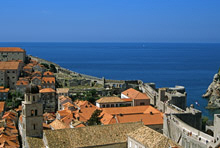
Typical street scene in Santa Ana, El Salvador. (Photo: iStock)
IMF Survey: Croatia Needs Further Fiscal Efforts, Structural Reforms
November 13, 2012
- Croatia is still struggling to restart growth after deep recession in 2009
- Further fiscal consolidation can restore sustainability, retain market access
- Structural reforms are critical for raising medium-term growth
Croatia’s economy has yet to restart growth, the IMF said in its annual economic review.

Dubrovnik, Croatia where, amid lack of confidence, economy is struggling to restart growth after the 2009 recession (photo: Mel Longhurst/VWPics/Newscom)
ECONOMIC HEALTH CHECK
With a slowing global economy and domestic spending held back by high unemployment, lack of confidence, and weak private sector credit growth, Croatia’s economy is expected to contract by 1½ percent in 2012 before growing by a modest ¾ percent in 2013, the IMF report said.
“The authorities’ fiscal consolidation measures in 2012 will likely achieve the targeted deficit, albeit partly due to regrettable underexecution of capital spending” said Nikolay Gueorguiev, IMF mission chief for Croatia. But further efforts are needed in 2013 and beyond to return to fiscal sustainability, he added.
The banking sector remains stable, well capitalized, and resilient to potential stress. However, the ongoing recession has increased nonperforming loans, as businesses and consumers struggle to pay back debt. The overall ratio of loans in trouble to total lending reached 13 percent in June 2012 compared with 4.9 percent in 2008, with the ratio for business loans at 23 percent, the IMF said.
Large risks
Significant slowdown in Croatia’s main trading partners in the European Union and the Balkans could lead to a sharp decline in exports and more job losses, further weakening domestic demand. Meanwhile, capital outflows could put pressure on the balance of payments, while reduced financing from foreign banks could shrink available credit.
Despite the launch of fiscal consolidation, the budget deficit remains high and public debt is rising fast while market confidence remains fragile. A large external debt denominated in foreign currencies and a high external financing requirement pose risks if problems in Europe deepen, the IMF said in its report.
In the medium term, without fundamental policy changes, sluggish growth due to deep-rooted competitiveness problems and elevated vulnerabilities will further weaken the economy’s ability to withstand economic and financial distress.
On the upside, the forthcoming EU accession could help spur official and private capital inflows. It is crucial that Croatia strengthen its capacity to absorb EU funds to take full advantage of the considerable opportunities that EU accession offers.
Macroeconomic policy priorities
The growing challenges facing the Croatian economy call for strong policy response. “The key policy priority is to implement a credible and balanced fiscal consolidation package in order to ensure medium-term fiscal sustainability. It will also be important to use monetary policy to facilitate macroeconomic adjustment and mitigate external risks. In addition, maintaining strong banking regulation and supervision would safeguard financial stability,” Gueorguiev said.
• Fiscal policy: Decisive implementation of gradual but steady fiscal consolidation is crucial to restore debt sustainability and retain market access. The consolidation plan should aim for a structural adjustment of about ¾ percent in 2013 and ½ percent a year after that until the structural budget deficit is eliminated. Such an approach would lower debt and reduce borrowing costs and financing risks. It would also create more fiscal space to support the economy in a downturn. “The authorities’ commitment to fiscal consolidation and expenditure retrenchment in 2012 is in this regard very encouraging,” said Gueorguiev.
• Monetary and exchange rate policy: While resisting large and harmful exchange rate moves, the Croatian National Bank (CNB) should continue to allow increased exchange rate flexibility, as has been the case since 2009. This affords some degree of freedom to monetary policy to support growth, limits speculation, and discourages further euroization. In order to build an important cushion against unfavorable external conditions, the CNB should also gradually increase the level of its international reserves.
• Financial policy: The central bank should maintain high statutory capital buffers, ensure adequate provisioning for nonperforming loans, and closely monitor liquidity and credit developments. It would also be important to swiftly remove obstacles to quick resolution of nonperforming loans, namely the slow bankruptcy process and the difficulties in foreclosing collateral. Given the tight links to parent banks in the euro area, cooperation with other supervisory authorities is essential to preserve financial stability.
Crucial structural reforms
Croatia’s difficult business environment and lackluster competitiveness continue to hold growth back. Labor force participation is very low, investment barriers are tall, and wages are high relative to productivity. All these factors are hindering Croatia’s ability to spur growth through exports, as evidenced by the country’s falling share of world imports and limited penetration in EU markets.
Comprehensive reforms are needed to return to robust medium-term GDP growth and reverse the sharp increase in unemployment, the IMF report said. The government’s recently adopted structural reform program is a good start. At the next stage, key reforms should be fleshed out, aiming to boost labor force participation, foster competition, and deal with unaffordable pension and health care entitlements.
The IMF estimates that reforms to improve labor force participation, raise investment, and strengthen productivity could boost GDP growth by about 2 percentage points in the medium to long term.


